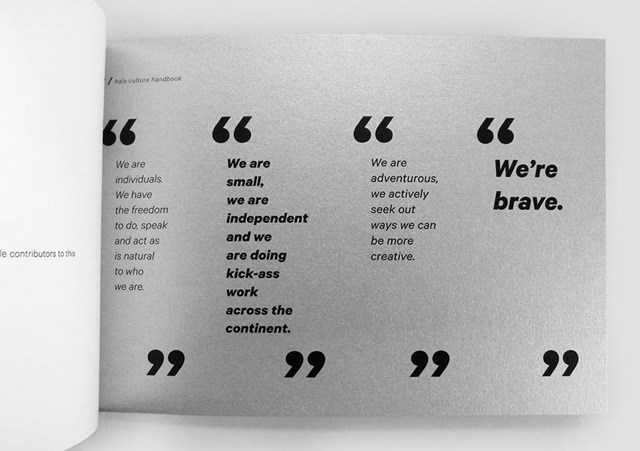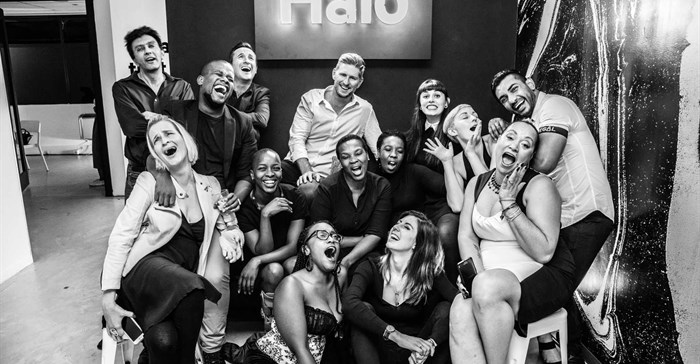#EmployerBranding: The importance of company culture

The agency also killed the human resources (HR) function, devolving the admin tasks in HR to their finance department and placing people and organisational culture under Leslie Sithole, Halo’s shiny new employee experience manager.
Sithole’s background is in marketing, PR and social media. Her new job description, which she will write on the job as it doesn’t really exist anywhere else in the industry, is to nurture the Halo company culture, which is centred around “creativity that connects”, inspire and mentor that creativity that unifies and brings people together.
Halo managing director, Dean Oelschig, is evangelical in his fervor about the importance of company culture. He explains that an enviable culture that everyone wants to work at ultimately retains and attracts the best talent.
“If we are selling creativity as a product, then creativity is a team sport, and if you have a good team… that ultimately serves the purpose of creativity.”
Halo as a company, started proactively pursuing culture in the agency a few years ago, Oelschig says, with the goal to:
- Get the best talent to knock on our door.
- Get the best clients to knock on our door and want us to work with them.
- Get a big agency network to knock on our door to offer to buy us, so we can say no, we want to remain independent - but it would be nice to be asked and recognised!
Culture is going to become one of the most valuable, tangible assets in a business. Many organisations define culture, but don’t do anything with it.
Globally, companies like Netflix and Airbnb are benchmarking employee experience, scrapping the HR role. The employee experience manager proactively has to keep people happy, motivated and inspired.
“Everyone has permission to act and the ability to speak up. We need to get teams working together and enjoying each other’s company and feeling free in front of each other. This allows for candid responses in regards to work, about the work, not the people. People are starting to understand that within the agency – and it isn’t easy, it requires a lot of collaboration, and we are starting to see the fruits of that,” says Oelschig.

Culture handbook
Halo then wrote its own culture handbook for the company and set about finding an employee experience manager to drive the process. As Oelschig reiterates: “Culture is going to become one of the most valuable, tangible assets in a business. Many organisations define culture, but don’t do anything with it.”
Oelschig believes Halo is setting benchmarks in the South African creative industry, a fact that is being recognised with recent creative awards and an increasing flow of top creative CVs. “Agencies are desperately trying to differentiate themselves, coming up with IP models… implementation is key.
“We created our own direct marketing campaign to clients, created our own culture document, created our own campaign. Leslie, as our employee experience manager, sits with every single person. We have also now created a template to go into companies and go do the same for them.”
Oelschig questions whether traditional human resources teams understand the role of creativity in engaging with staff members to create an impactful culture. “The HR function is analytical, admin focused… they haven’t been taught how to use creativity.”
Internal initiatives
Halo fosters its creative culture through many internal initiatives, trying new things and refining its offerings to its teams all the time.
“I don’t do this all on my own,” explains Sithole. “I have to combine company and client strategy - that is what makes Halo great. The employee experience has to match the client experience. We need to be a team, a unit. We have initiatives like skills sharing, recognition programmes, to make the whole experience in the company better.”
This is bolstered by regular weekly and monthly team getogethers, some compulsory, others voluntary, such as ‘Late Night Wednesdays’ where they serve dinner at 8pm, encouraging employees to stay behind in the office and work on side projects; ‘Crush It Fridays’ where at 3pm everyone talks about something they crushed on that week; a monthly ‘Breakfast Club’ which enables candid feedback; and knowledge sharing sessions every Thursday, where people have to stand up and talk to broaden their and everyone else’s horizons.
“Creativity is a team sport and culture is what puts a team together. The best sports teams of the world have culture within those teams, it’s not just the best coaching. It’s a high performance culture and that is the end goal of this for us. We want our culture and every person who works with us to benefit,” adds Oelschig.
“In the last 18 months I really started to understand the importance, in terms of leadership, of what that meant. We certainly have seen an impact on the talent side. We went through a hectic recruitment drive recently. I have to be incredibly diligent about hiring the right people. We have a saying: ‘we would never hire anyone we wouldn’t want to have a beer with’.
“Our creative work is definitely better in the last 19 months because of the people we have been able to attract and the talent we are employing. Culture is hugely important to maintain that level of talent,” Oelschig concludes.






































